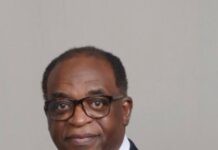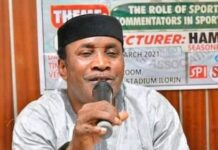 I thought I had nothing more to say. That after 5 years of writing weekly, everything that I could possibly say about Nigeria, had already been said. But I find that when it comes to Nigeria – heartbreak country –there will always be new lows.
I thought I had nothing more to say. That after 5 years of writing weekly, everything that I could possibly say about Nigeria, had already been said. But I find that when it comes to Nigeria – heartbreak country –there will always be new lows.
There have been many things written and said about the removal of the Governor of the Central Bank of Nigeria but not enough about three things: the importance of institutions; the personalization of office; and the ‘clean hands’ argument.
There is a reason Obama’s first key message to Africa as President was “Africa needs strong institutions, not strong men”. Yet, with the summary removal of the CBN Governor, the President of Nigeria took a bulldozer to the foundation of CBN’s independence which is critical for institution building, a healthy fiscal regime and the economy. It is not a coincidence that over the last 30 years, the number of countries with independent central banks increased from 20 to more than160.
Regardless of what we think about the relationship between previous administrations and past CBN Governors, until now, no one ever blatantly yanked off the veil of doubt about the CBN’s independence from the Presidency. There is a reason why after over two hundred years of US democracy, no President – even with constitutional powers, has ever removed the head of the Federal Reserve Board. One tried – and it earned him impeachment proceedings.
The problem with not waiting for the CBN Governor’s term to be over in June and then prosecuting him on the basis of the FRC report is that the timing leaves the President open to the accusation that he has no respect for the checks and balances necessary in a real democracy. In a country where ‘I am loyal’ is a salutation, successive Presidents may expect a CBN Governor who is loyal to them and not to the responsibilities of the office. It means that the public; witnesses to the crude and anti –constitutional removal, may presume that the new CBN Governor is a ‘yes man’ of the worst kind.
This brings us to the issue of increasingly blurred lines of distinction between occupiers of a position and the position. It is a dangerous norm in Nigeria to personalize public office – for a person to take on a role today and the next, become known to all, even parents, only as ‘DG’, ‘HM’ or ‘Honorable’. It is this inability to distinguish between person and position that has contributed to the degradation of our institutions. If the President, his advisers and supporters could distinguish between individual and ‘office’, they would understand that regardless of the alleged virtue of their position today, there could be a different type of President and a different type of Governor in the CBN 10 years from now and by setting this dangerous precedent, the independence of the CBN has been compromised.
There is a maxim in law – ‘he who comes to equity must come with clean hands’. It means that a plaintiff who brings a case before a court seeking justice must also not be guilty of the same offense. There seems to be a presumption that the disclosure about billions of dollars missing from oil revenue remittance is wrong because the Governor got a share or that the controversial CSR spend is linked to the missing billions. No. In the application of the maxim, the bad conduct that is condemned must be part of the transaction that is subject of the lawsuit. Yet this maxim is being used as a defense for the illegal removal of the CBN Governor. This line of thinking leads us deeper into the trap of brazen embezzlement of public funds which we find ourselves in. There is already a tacit understanding that only the compromised or compromiseable can get into the highest offices. Yet we want the compromised and compromiseable to have no personal thresholds. In summary, Nigerians with a track record for honesty (saints as political realists call them) cannot get into office, but we expect the sinners who get in to be honourable and never rat on gang members.
The Economist’s ‘What is wrong with democracy?’ says one reason why so many democratic experiments have failed recently is the emphasis on elections to the detriment of other essential features of democracy (such as building independent institutions). “The power of the state needs to be checked and the first sign that a fledgling democracy is heading for the rocks often comes when elected rulers try to erode constraints on their power – like the President did by illegally removing the CBN Governor from office. No amount of obfuscation about suspension and removal will change that. Weak institutions and a refusal to adhere to our written laws are major factors in our continued underdevelopment and social and political decline. Until we insist that laws are respected with no personal exceptions for individuals in power, amendments to our constitution will not help. As James Madison argued about the working of democracy, “you must first enable the government to control the governed; and in the next place oblige it to control itself.” This goes for every President and every CBN Governor.


